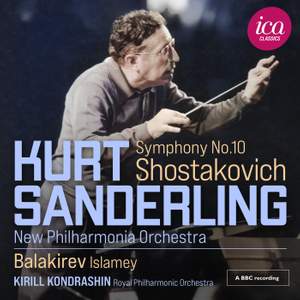
Dmitri Shostakovich (1906-1975)
Symphony No 10 in E minor, Op 93 (1953)
Mily Balakirev (1837-1910)
Islamey, Op 18 (orch. Casella) (1869)
New Philharmonia Orchestra/Kurt Sanderling (Shostakovich)
Royal Philharmonia Orchestra/Kirill Kondrashin (Balakirev)
rec. May 1973 (Shostakovich), January 1978 (Balakirev), Royal Festival Hall, London
ICA Classics ICAC 5171 [62]
Kurt Sanderling is among the great interpreters of Shostakovich’s music and especially of his Tenth Symphony. Perhaps only with Mravinsky and Sanderling did the composer share the experiences of what this symphony is all about. It reflects a turning point in Russia following the death of Stalin in 1953. Following several years as a conductor at the Kharkiv Philharmonic, Sanderling lost his orchestra after the Nazi invasion of the USSR and was invited to join the Leningrad Philharmonic then in ‘exile’ in Novosibirsk, giving concerts there. Sanderling arrived in a converted cattle truck to be met by his friends in the orchestra – he had conducted the orchestra before the war – and quickly joined the work-sharing concert programmes with Mravinsky.
He became a lifelong friend of Shostakovich who was there for the local premiere of his Seventh Symphony. Until 1960 – when he left to work with the Berlin Symphony Orchestra in the German Democratic Republic – Sanderling conducted those works that Mravinsky did not – most notably Shostakovich’s First Symphony, the early Tchaikovsky symphonies, and symphonies by Sibelius, Rachmaninov and Weinberg. In my opinion, Sanderling’s recordings of Rachmaninov and Sibelius with the Leningrad Philharmonic on DGG are of outstanding historical merit.
Although Sanderling recorded this and several other symphonies with the Berlin Radio Symphony Orchestra, this live performance of Shostakovich’s Tenth is immensely powerful. From the first bars of the opening Moderato, Sanderling embraces the tragic threnody of this darkly-hued score. The emotionally draining force of the string playing is broken only at the close of the movement by the agonisingly miserable idea expressed on the woodwind.
The brief Allegro is an exciting tour de force with every musician playing his heart out in this dramatic piece, performing at great pace and with great intensity. One almost feels the need for a brief rest before the engrossing third movement, Allegretto, where we enter a different world of mystery and suspense distinguished by the wonderful virtuosity of the French horn repeating the intangible motif. The final movement, Andante -Allegro, returns to the idiom of the first movement with the strings voicing a requiem for the tragic times in which this music was written, before the woodwind introduce an uplifting theme bringing this remarkable symphony to a stirring close. At this time, the Tenth was not heard often in the concert hall, and the stormy applause at the close reveals that we are sharing in a great musical event.
Balakirev is a composer rarely performed even in Russia, yet there are several finely-crafted orchestral pieces by this member of the Mighty Kuchka group of Russian nationalists; of particular note are the tone poem Tamara, Overture on Three Russian Themes, In Bohemia, and his two symphonies – the first of which is a beautifully written work worthy of a place in the repertoire of the world’s symphony orchestras. Kondrashin never recorded Islamey in the studio, and it is handled, as are many of his recordings, at a fast, dynamic pace but still allowing the beautiful ideas and melodies to sing. As did his colleagues Svetlanov and Rozhdestvensky, Kondrashin knew how to conduct this extraordinary piece to allow all its rich folk harmonies to emerge. This is a terrific performance, and a fascinating ‘filler’ to this CD of Russian music. The recording quality on both works is excellent, with fine stereo balance by the BBC engineers.
The CD encloses a 12-page booklet with texts by Harlow Robinson in English and German detailing the music and the conductors’ careers.
Gregor Tassie
Help us financially by purchasing from





















